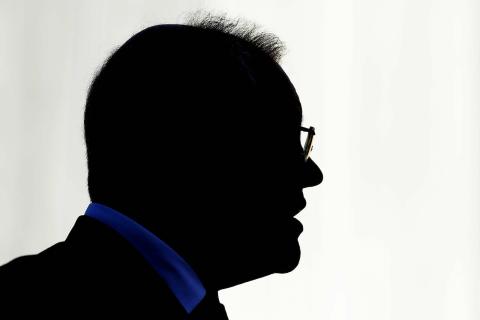 Fiji's 2013 constitution calls for a separation of powers between military and police (Photo: Getty)
Fiji's 2013 constitution calls for a separation of powers between military and police (Photo: Getty)
Fiji’s Police Commissioner Ben Groenewald ended his contract this week. The official statement from the Fiji government cited personal and family reasons for the Commissioner’s departure, however Groenewald admitted in an interview with Radio Australia’s Bruce Hill that the Fiji military’s interference in policing 'indirectly' influenced his decision. The Fiji military’s Land Force Commander, Colonel Sitiveni Qiliho has been appointed acting police commissioner.
The South African Groenewald had earned respect in Fiji and the wider region in his relatively short term for improving the performance of the Fiji police and dealing effectively and transparently with disciplinary issues. In the post-2006 coup era, Fiji’s police commissioners were drawn from senior military ranks; Colonel Esala Teleni and then Brigadier General Ioane Navilarua, who were not universally regarded as effective. It was therefore a positive achievement for Fiji, as it rebuilds its democracy and implements a new constitution, to have its police force led by an independent and experienced police officer who was not linked to the military.
In contrast, the appointment of Land Force Commander Qiliho as acting police commissioner is a poor decision on many fronts. The appointment was formally made by Fiji’s outgoing president, on the advice of Prime Minister Bainimarama as chair of the Constitutional Offices Commission. Bainimarama’s choice of one of his former military colleagues harks back to the post-2006 coup era and pre-2014 election when Bainimarama put senior military officers in the roles of police commissioner and heads of civilian government agencies. The Qiliho appointment indicates the prime minister is happy for the military to be influencing the police. [fold]
Fiji’s 2013 constitution and the 2009 State Services Decree make clear the separation of powers between the military and police. The prime minister’s decision to appoint a senior military officer to the police commissioner’s position, even temporarily, blurs this distinction and undermines his commitment to the constitution.
The prime minister’s choice of Qiliho in particular is worrying because Qiliho has just recruited into the military three police officers charged in relation to the infamous torture video (warning: video contains graphic images). The three suspended officers were charged in relation to the assault captured in the video, that went viral nearly three years ago. Qiliho has claimed the police had abandoned the officers. Although Groenewald did not name this case when he made his claims about military interference in policing, this is the clearest evidence of such.
Qiliho says he recruited the three officers so they would be provided with lawyers but it sends an unfortunate message to the Fiji people that he is more interested in protecting the alleged perpetrators of crime than condemning the crime. His approach is in marked contrast to Groenewald who made it clear he would not tolerate any ill treatment of the citizenry by police, and has actively investigated allegations of police brutality.
The people of Fiji are entitled to have confidence that their police commissioner will protect their rights as well as those of police officers. The appointment of Qiliho does not inspire such confidence.
Groenewald’s admission that the military are interfering in policing was important because it means this can be discussed within Fiji. The Republic of Fiji Military Forces are regarded as something of a sacred cow in Fiji. Few politicians are prepared to tackle the issue of the military’s extraordinary influence in the country, not least because of the three coups the military has engineered.
Groenewald’s admission also, however, has the potential to make recruiting a new police commissioner more challenging. There are unlikely to be many qualified candidates within Fiji, and it may be difficult to find foreign candidates who are prepared to deal with what may be continuing attempts by the military to interfere in policing operations, particularly if there is scant government support for preserving police independence.
After the elections last year, I argued Fiji had more to do to restore democracy, and in this Policy Brief I said Australia should continue to back Fiji’s transition to democracy beyond the elections. Australia is supporting good governance in Fiji through its aid program but could further assist by offering to help with the recruitment process for a new police commissioner.
Groenewald's admission and departure, and Col Qiliho’s subsequent appointment, are setbacks for Fiji’s rebuilding democracy project. If the military continues to assert its influence over policing in Fiji, police will struggle to perform their constitutional role effectively. The government’s commitment to the 2013 constitution and to the rule of law then has to be questioned.
But the situation is not beyond repair. The appointment of another independent and experienced police officer to the police commissioner’s job is critical. The Fiji government should recognise it has a constitutional duty not only to recruit a qualified person, but to also support the police commissioner in carrying out his or her duties independently of the military.
Fiji’s international partners should convey their interest in this process and offer to assist with an international recruitment process to find the best candidate.
